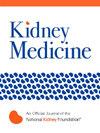Hemoadsorption as a Supportive Strategy for Severe Toxicity Associated With Chimeric Antigen Receptor T-Cell Therapy: A Case Series
IF 3.4
Q1 UROLOGY & NEPHROLOGY
引用次数: 0
Abstract
Rationale & Objective
To describe the use and effects of extracorporeal blood purification with hemoadsorption in managing severe complications after treatment with chimeric antigen receptor T-cells (CAR-T).
Study Design
Retrospective analysis of a case series.
Setting & Participants
Hematological department and intensive care unit from a single institution. Patients with hematological cancer who underwent CAR-T therapy between 2021 and 2023, developed severe toxicity, and were treated with hemoadsorption based on clinical indications.
Results
Of 48 patients, extracorporeal blood purification was prescribed to 4 (8.3%): 3 with diffuse large B-cell lymphoma and 1 with mantle cell lymphoma. These patients experienced rapid increases in serum interleukin-6 and ferritin levels after CAR-T infusion, which progressed to severe cytokine release syndrome with hemodynamic instability and multiple-organ toxicity. Despite corticosteroid and anakinra rescue therapy after tocilizumab failure, extracorporeal blood purification with hemoadsorption was initiated at a mean of 5.2 ± 1.7 days following CAR-T infusion due to rapid clinical deterioration. The treatment was performed using continuous venovenous hemodiafiltration with an AN69ST hemofilter and a CytoSorb cartridge. One patient died 1 day after the initiation of blood purification because of concomitant cardiomyopathy progressing to multiple-organ failure. In the 3 surviving patients, interleukin-6 levels significantly decreased (from −18% to −95%), cytokine release syndrome resolved, and vasoactive support was reduced. Treatment-related complications were not observed.
Limitations
Small sample size, retrospective design, and lack of a predefined hemoadsorption therapy protocol.
Conclusions
A strategy based on hemoadsorption was safe and effective in mitigating inflammation and improving hemodynamics in patients with hematological cancer treated with CAR-T therapy who developed early severe toxicity.
Plain Language Summary
Chimeric antigen receptor T-cell (CAR-T) therapy may improve remission rates and survival in hematological cancers but can lead to severe side effects, including cytokine release syndrome (CRS). CRS is characterized by systemic inflammation and multiorgan toxicity and is often associated with poor outcomes. Although pharmacological treatments are available, some cases remain refractory. In this study, we share our experience with hemoadsorption as a supportive therapy for severe CRS in CAR-T recipients. Of the 4 patients treated, 3 experienced CRS resolution with reduced inflammation and improved hemodynamic stability, without treatment-related complications. These findings highlight hemoadsorption as a promising adjunctive therapy to pharmacological treatments for managing severe CAR-T toxicities. Further research is needed to confirm these results.
血液吸附作为一种支持策略,对与嵌合抗原受体t细胞治疗相关的严重毒性:一个病例系列
基本原理及目的探讨血液吸附体外血液净化技术在治疗CAR-T术后严重并发症中的应用及效果。研究设计对一系列病例进行回顾性分析。设置,参与者来自同一机构的血液科和重症监护病房。2021年至2023年间接受CAR-T治疗的血液癌患者出现严重毒性,根据临床适应症采用血液吸附治疗。结果48例患者中,4例(8.3%)采用体外血液净化,其中3例为弥漫性大b细胞淋巴瘤,1例为套细胞淋巴瘤。这些患者在CAR-T输注后血清白细胞介素-6和铁蛋白水平迅速升高,并发展为严重的细胞因子释放综合征,伴有血流动力学不稳定和多器官毒性。尽管在托珠单抗失败后使用皮质类固醇和阿那单抗进行救援治疗,但由于临床迅速恶化,CAR-T输注后平均5.2±1.7天开始使用血液吸附进行体外血液净化。使用AN69ST血液滤器和CytoSorb滤筒进行连续静脉-静脉血液滤过治疗。1例患者在开始血液净化1天后因并发心肌病进展为多器官衰竭而死亡。在3例存活的患者中,白细胞介素-6水平显著下降(从- 18%降至- 95%),细胞因子释放综合征缓解,血管活性支持减少。未观察到治疗相关并发症。局限性:样本量小,回顾性设计,缺乏预定义的血液吸附治疗方案。结论基于血液吸附的CAR-T治疗策略对早期出现严重毒性的血液癌患者的炎症缓解和血流动力学改善是安全有效的。嵌合抗原受体t细胞(CAR-T)治疗可以提高血液病的缓解率和生存率,但可能导致严重的副作用,包括细胞因子释放综合征(CRS)。CRS的特点是全身性炎症和多器官毒性,通常伴有不良预后。虽然药物治疗是可行的,但有些病例仍然难治性。在这项研究中,我们分享了将血液吸附作为CAR-T受体严重CRS的支持治疗的经验。在接受治疗的4例患者中,3例CRS缓解,炎症减轻,血流动力学稳定性改善,无治疗相关并发症。这些发现强调了血液吸附作为一种有希望的辅助疗法来治疗严重的CAR-T毒性。需要进一步的研究来证实这些结果。
本文章由计算机程序翻译,如有差异,请以英文原文为准。
求助全文
约1分钟内获得全文
求助全文

 求助内容:
求助内容: 应助结果提醒方式:
应助结果提醒方式:


